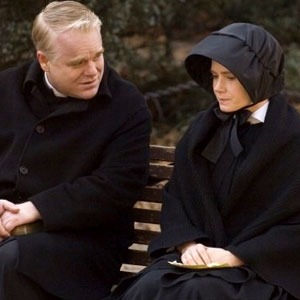 Miramax Films
Miramax FilmsReview in a Hurry: At a Bronx Catholic school in the '60s, the fiercely fundamentalist headmistress, Sister Aloysius (Meryl Streep), begins to suspect something untoward has happened between the more liberal Father Flynn (Philip Seymour Hoffman) and the school's only black student (Joseph Foster). Unfortunately, her evidence is purely circumstantial, and the film leaves it up to you decide what really happened.
The Bigger Picture: In adapting his own play to the screen, John Patrick Shanley makes all the right moves, from expanding what was once a four-character cast into a full classroom and letting us actually get to know the boys as characters. He has also smartly hired genius cinematographer Roger Deakins, whose crisp focus and creative angles make the story compelling on a visual level in addition to the already award-winning dialogue.
It's hardly news to anyone reading this that Streep and Hoffman are among the best actors working today, but they are more than equaled by Amy Adams, whose Sister James is caught in the middle, and Viola Davis as the boy's mother, delivering a performance that steals the whole show in a mere two scenes.
And yet, as good as Streep is, she may be just slightly burdened by being Meryl Streep. The dramatic arc of the story is that her character is the kind of nun you're inclined to hate and fear, but ultimately, as much as you'd never want to meet her, you start rooting for her as the only one dogged enough to try and root out a possible pedo-priest. Yet you just can't ever hate or fear Streep—even when she plays villains...They're sympathetic ones. It's like trying to hate Jimmy Stewart. A Louise Fletcher or Kathy Bates type might have been more appropriate in the role; someone famous for harridans but not unfamiliar with heroics.
Still, the main event here is getting to see her spar with Hoffman, and that doesn't disappoint. And while you wonder whether he did anything to the boy or merely feels extra-protective toward him for being a persecuted minority, you're also meant to wonder whether doubt is in fact more beneficial than faith and certainty. By then, you will likely have made a judgment, and the film calls on you to judge yourself for it. Thought provoking enough not to be dumb, but straightforward enough that most viewers will get it.
The 180—a Second Opinion: If you like tidy conclusions and go in thinking this is gonna be a whodunit that lays it all out at the end, you will be disappointed.